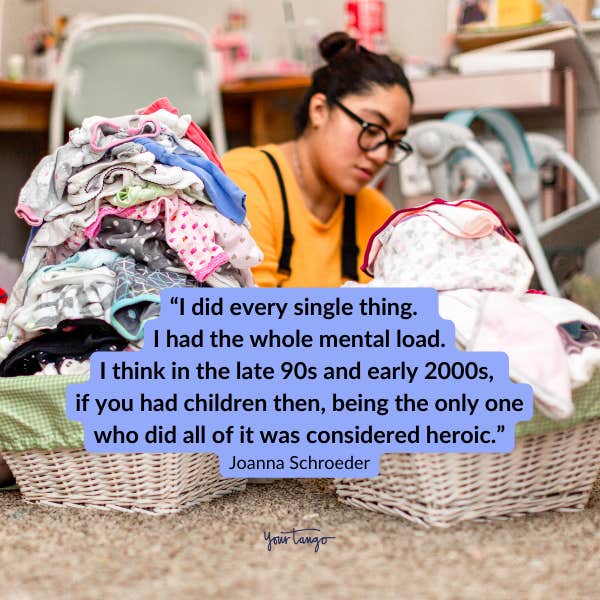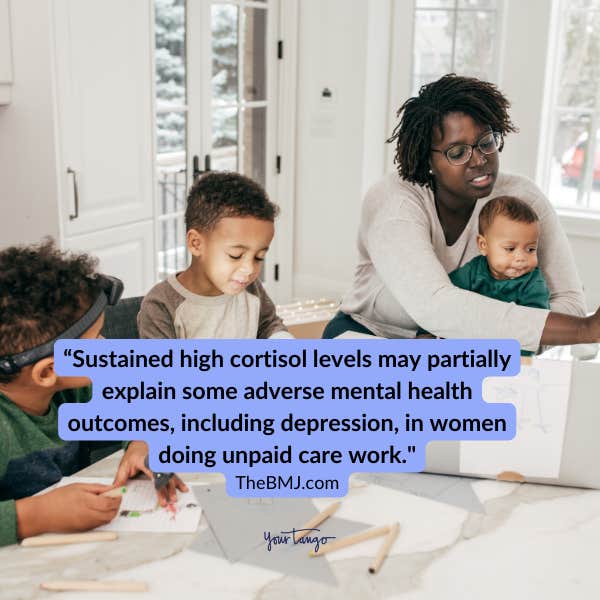Feminism Was Supposed To Liberate Women — So Why Are So Many Working Moms Exhausted?
Is this what our feminist foremothers fought for? Dr. Sue Johnson says 'no'.
 peopleimages.com - Yuri Arcurs
peopleimages.com - Yuri Arcurs Have you ever had one of those moments where you hear someone speak honestly, and you realize it's exactly how you feel — but you've never been able to express it before? Once the words are out there in front of you, you are able to not only name a feeling that's been nagging at you — you also feel less alone.
This happened to me just now, as I listened to a podcast featuring a therapist, Dr. Sue Johnson, author of the best-selling relationship book Hold Me Tight, and two working mom co-hosts, Joanna Schroeder and Andrea Miller, as they discussed how overwhelming it can be to try to manage work, kids and relationships.
I'm not sure I've recently related to anything so hard than when Schroeder, co-host of Open Relationships: Transforming Together, says:
"There's one hundred apps that are supposed to make it easier to parent, and what it's actually making is me bonkers!"
How, with all the technology available and a world that is supposed to be more fair and equal for women, are we at a place where almost every working mom I know is completely exhausted? How do we have faster access to our kids, to information, to our schedules and more — and still find ourselves incapable of keeping up without completely depleting ourselves?
Is this what our feminist foremothers fought for?
RELATED: If You Feel 'Burnt Out' All The Time, You Likely Suffer From This Serious Disease
I currently have 458 unread text messages, and at least 450 of those are from a dozen apps I have to have to keep track of my kid's schools and sports teams.
I'm long past the point of being bothered by unread notifications. I've learned to live with the overwhelming dread they give me, just like I've learned to live with all the other overwhelming aspects of modern motherhood — accepting that this is part of the package deal, that you don't get to be a mom without being chronically overwhelmed. Well, at least not a "good" mom.
After all, aren't "good" moms martyrs? Don't they sacrifice their own well-being for the sake of everyone else? Don't the very best moms have it all and balance it all?
I won't speak for others, but this former gifted, people-pleasing, praise-seeking little girl could not think of anything else more logical to aspire to than a woman and a mother who does it all, dancing backward in high heels.
Dr. Sue Johnson says feminism was supposed to be a liberation, but it failed working moms in many ways
Johnson joined co-host Andrea Miller and Schroeder in commiserating about the impossible balance of having it all as a mother for part of her interview on the most recent episode of YourTango's "Open Relationships" podcast.
"There was such a sense of heroic individualism for moms," said Schroeder, "that I, as a mom, was expected to do everything. I did every single thing. I changed 90% of the diapers, I was the one up with the kids all the time. I did the cleaning, I did the cooking, I had the whole mental load," referring to the time in her life when her oldest children, now adults, were babies.
"I think in the late 90s and early 2000s, if you had children then, being the only one who did all of it was heroic," Schroeder added.
 Photo Credit: timnewman from Getty Images Signature
Photo Credit: timnewman from Getty Images Signature
Johnson replied, "Feminism was supposed to be a liberation... speaking as a feminist, that's how I see it. Or was it?"
She went on to say that what seems to have come about with feminism is women saying:
"I want a life and I'll do all the other stuff, as well. I'll be the most perfect mother and most perfect partner, and I'll be the CEO and write a book."
That may seem like an awful lot to expect, and only a rare woman is doing all of that, but the truth is, most women with children are working outside the home. It doesn't matter if they're CEOs who write books, teachers, nurses, or working in the service industry — it feels like workplace demands are becoming more overwhelming by the week, all while parenting becomes even more intense with all of the technology and apps to manage.
Ultimately, the women in this episode represent many others who take on everything in their careers, while struggling not only to keep up at home — not to mention trying to stay mentally, physically, and emotionally healthy. And I so relate!
But who is truly to blame? Feminism, employers, the apps? Dads? Or society overall?
Is feminism the culprit?
When it comes to women feeling overwhelmed and exhausted, worked to the bone in their careers and struggling to stay ahead at home, who is really to blame? After all, as Johnson, Miller and Schroeder acknowledge, feminism is a good thing.
It seems to me the big problem is a society that made space for the progression of women's lives outside of homemaking — but didn't create systems to fill in the gaps when women branched out.
Studies show that there is a direct correlation between women who feel their household tasks and childcare obligations are highly stressful and increased activated neurohormones, including cortisol.
The BMJ reports "Sustained high cortisol levels may partially explain some adverse mental health outcomes, including depression, in women doing unpaid care work."
 Photo Credit: kate_sept2004 from Getty Images Signature
Photo Credit: kate_sept2004 from Getty Images Signature
This stress, of course, is in addition to the ever-present fear that we are not doing the best we can for our kids.
The exhaustion and depression from our overflowing list of obligations and tasks spill over to our relationships with our children. We try to compensate for those feelings by DOING more for them. And the cycle continues on and on — for many of us until we break.
RELATED: I'm A Feminist And I Don't Think Women Should Have To Work
The key to being the best parents we can be, however, is not in doing more, but in connecting more, Johnson says.
"You don't have to be a 'perfect' mother according to some formula. The bottom line is — attachment says — you have to be able to emotionally connect with your kids. That's the answer," said Johnson.
Whether or not feminism is the root of our collective burnout, it's clear we need to stop burdening ourselves with so many high expectations, especially while society goes on pretending women can keep up this impossible balance.
We need to recognize that our pursuit of "having it all" — for many of us — is keeping us from truly having what we really desire the most: a safe, secure connection with our kids.
Jill Krause, the YourTango Thought Leader Editor, is a writer and content creator with a focus on maternal mental health and midlife reinvention. She’s a published author and has been recognized for her work by Time, Vogue, Washington Post, Us Weekly, Today, and more.

